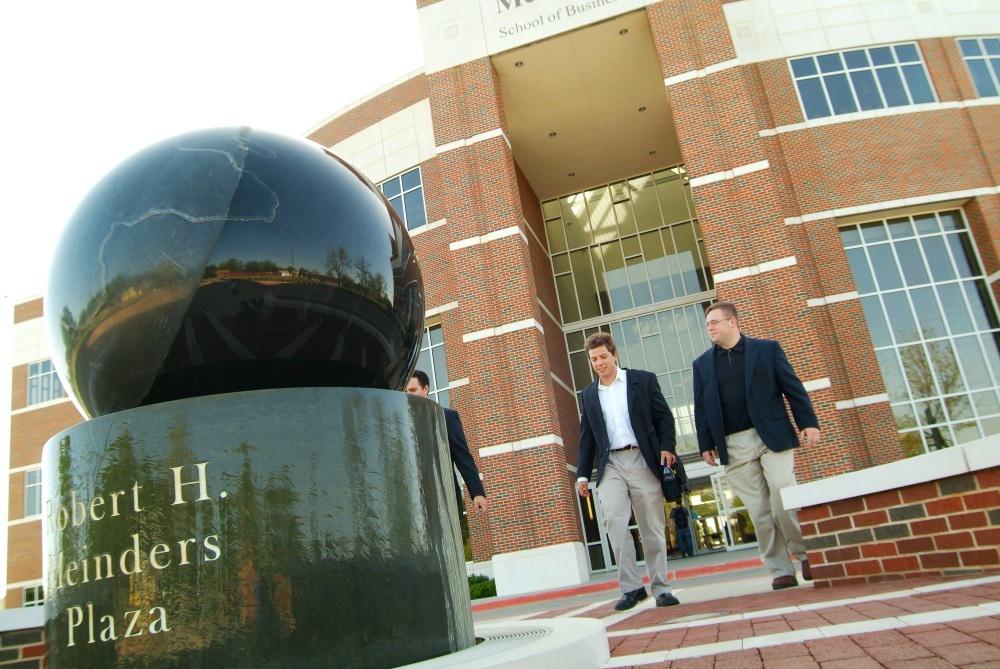Ever wonder how your favorite products get from the factory floor to your shopping cart? Behind the scenes, a network of systems and processes ensures that goods flow seamlessly from raw materials to factories to stores, and in many cases straight to your doorstep.
Supply chain management, sometimes called supply chain logistics, is the process of planning, implementing, and controlling the efficient flow of goods and services from a point of origin to a point of consumption. It involves everything from sourcing raw materials to managing transportation and inventory.
Job opportunities are plentiful and expected to grow in the foreseeable future, a trend that led OCU University’s Meinders School of Business to introduce an undergraduate degree in Supply Chain Management earlier this year. In fact, according to the , the demand for logisticians will grow by 19% over the next 10 years, putting the profession into the “much faster than average” growth category.
Chris Oberst, director of distribution for –þ–þ ”∆µ-based Love's Travel Stops, said one major reason for the growth in the profession is because of the rise of e-commerce giants like Amazon.
“It’s a very hot job market, from managerial positions, to analyst and planning functions, to the hourly team member,” Oberst said. “Consumer expectations have changed radically over the last 10 or 15 years. When Amazon introduced two-day shipping, an arms race ensued. This trend has only increased as other retailers more aggressively compete in the ecommerce space.”
Any time you can condense the timeframe — from the time you press the button to the time it’s on your doorstep — that product has to be warehoused closer to the consumer. With more warehousing space comes more supply chain management.
“Backrooms in retail stores used to be exclusively used to store back-stock for the floor. Now, these same backrooms are used as mini distribution centers, fulfilling upwards of 50% of online orders at certain retailers,” Oberst added.
Globalization and technological advancements have also contributed to the growing complexity of supply chains. Besides the core program courses, Oberst says students hoping to join the profession should also focus on IT, managerial, and data analytics skills.
“As businesses continue to make outsized strategic investments in their supply chains, you can expect the level of sophistication to also increase,” he said. “This leads to more dependencies on IT systems and processes, magnifying the need for supply chain leaders to possess technical skills.”
The –þ–þ ”∆µ area has a plethora of major players in supply chain management. Love‚Äôs Travel Stops, Hobby Lobby, Braum‚Äôs and energy companies are based locally, and several others like Coca-Cola and Hewlett-Packard have major operations in the region. Locke Supply announced in August a major expansion of its distribution operations, and other new warehouse projects are coming to areas near the city‚Äôs airport.
Several events in recent years have exposed the need for companies to improve their supply chain management, Oberst said.
“COVID changed things quite a bit. It exposed the organizations that had failed to strategically invest in their supply chain,” he said. “Increased consumer expectations, coupled with disruptive global events, have brought supply chain to the forefront for business leaders. To succeed in today’s complex business environment, good supply chain management is a must-have.”
Some managers, like Oberst, travel frequently to visit the company’s distribution centers and/or store locations. As supply chain leaders progress in their careers, administrative duties such as budgeting, profit and loss management, and strategic planning become more common.
New college graduates would more likely start out as front-line supervisors for a company’s major functions like warehousing, distribution, packaging, order fulfillment or transportation.
“Working in supply chain management offers an exciting and dynamic career path,” Oberst said. “Professionals in this field play a crucial role in ensuring that products move seamlessly from manufacturers to consumers, often adapting to rapidly changing market conditions. With the complexity of supply chains increasing due to globalization and technology, there's a growing need for skilled individuals who can navigate these challenges.”
Earlier this year, –þ–þ ”∆µ partnered with one of the top supply chain programs in the nation to provide a new undergraduate business degree. Read more about the partnership here or visit the program web page for more information.
Job breakdown
A typical day for a supply chain manager might involve:
- Negotiating contracts with suppliers to secure the best deals on materials and services.
- Optimizing transportation routes to reduce costs and minimize environmental impact.
- Managing inventory levels to ensure that products are available when customers need them.
- Monitoring supply chain performance to identify areas for improvement.
Skills and Qualifications
To succeed in supply chain management, you'll need:
- Strong analytical skills: The ability to analyze data and make informed decisions.
- Problem-solving skills: The capacity to identify and address challenges efficiently.
- Communication skills: The ability to effectively communicate with stakeholders at all levels.
- Technical skills: Proficiency in supply chain management software and tools.

